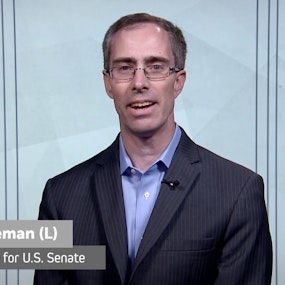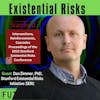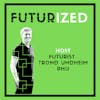The Future of Cleantech

Neal Dikeman, Managing partner and founder of Energy Transition Ventures, interviewed by futurist Trond Arne Undheim.
In this conversation, they talk about Where do we currently stand on energy transition? Disruptive forces (tech, regulation, business m...
Neal Dikeman, Managing partner and founder of Energy Transition Ventures, interviewed by futurist Trond Arne Undheim.
In this conversation, they talk about Where do we currently stand on energy transition? Disruptive forces (tech, regulation, business models, social dynamics). What is the role of energy policy v. the free market? Which energy models to trust? The emergent energy mix and how it will evolve? When will renewables surpass fossil fuels in the US and globally? Exciting startups. Emerging business model plays. Macro trends. The role of clean energy into the next decade.
The takeaway is that cleantech is coming of age. The reason is slightly counterintuitive. It is not happening because of government action, at least not (yet) in the USA. It’s not happening because more people want to save the planet. Rather, it’s happening because renewables, after a slow rise over decades, are reaching energy parity with fossil fuels. No matter what happens to policy, to global treaties, or what might be the Biden Presidency priorities, over the next few years we will witness an energy transition without parallel in our history. Add some policy action to that, and we will experience a sea change, which is about time, because sea levels are rising.
After listening to the episode, check out Energy Transition Ventures, Cleantech.org, as well as Neal Dikeman's online profile:
- Energy Transition Ventures https://energytransitionventures.com/
- Cleantech.org http://www.cleantech.org/
- Neal Dikeman (@nealdikeman) https://www.linkedin.com/in/dikeman/
Thanks for listening. If you liked the show, subscribe at Futurized.co or in your preferred podcast player, and rate us with five stars. If you like this topic, you may enjoy other episodes of Futurized, such as episode 12 Future of nuclear waste or episode 15 The future of pre-seed investing, episode 20 Future of engines, episode 21 What's next in Energy storage, episode 63 Hunting for Emerging Tech, episode 76 Risk and Resilience, or episode 38 Disaster risk management. Futurized—preparing YOU to deal with disruption.
EnergyTransition_mixdown
Trond Arne Undheim, Host: [00:00:00] Futurized goes beneath the trends to track the underlying forces of disruption in tech policy, business models, social dynamics, and the environment. I'm your host throne honor, and Heim, futurist and author. In episode 70 of the podcast, the topic is the future of clean tech. Our guest is Neal Dikeman, managing partner and founder of energy, transition ventures, and chair of the clean tech.org network.
[00:00:30] Now a quick word from one of our partners, cleantech.org is a leading virtual research Institute at incubator to the clean tech sector, but then online membership base of over 45,000 subscribed to the site to learn more about Cleantech and meet scientists and entrepreneurs to commercialize your ideas, contact info@cleantech.org.
[00:00:55] That's cleantech.org. In this conversation, we talk about where we currently stand on energy transition. We discussed the disruptive forces of technology, regulation, business models, and social dynamics, and what the role is of energy policy versus the free market, which energy models to trust the emergent energy mix and how it will evolve when we'll have renewables, surpassed fossil fuel fuels in the U S and globally, we discussed the exciting startups, emerging business model, place, macro trends, and the role of clean energy into the next decade.
[00:01:39] Nail. Great to see you. How are you?
[00:01:42] Neal Dikeman, Investor: [00:01:42] Morning, Tron. It has been a, it's been a while. I'm delighted to see you again. I'm doing pretty well.
[00:01:47] Trond Arne Undheim, Host: [00:01:47] That's good to hear. And I actually used the wrong word here because we're podcasts, good to see you, but we of course see each other and the people who get on the video will enjoy, but it is actually good to hear your voice.
[00:01:58] It was what I meant. Anyway, Neil you are this a serial entrepreneur slash venture capital slash environmentalist slash libertarian. There are so many things and it's almost impossible to know where to start with you, which I think is the. Is the hallmark of a good guest but anyway you are now involved with at least two different ventures that we're going to talk about, but in your past, you have worked at Royal Dutch shell Jane capital partners.
[00:02:27] So you built up clean tech.org, this a massive website discussing and, making progress on clean tech and building a community around it. What else have I forgotten? And how did you get to where you are, which is you have run for office in Texas. You have been deeply involved with both politics and the environment and massive amounts of commercialization.
[00:02:51] How did you get there and why are you at this point? You need to have you traced your psychology and figured out how this is all happened.
[00:02:59] Neal Dikeman, Investor: [00:02:59] Some of it is probably just dumb luck. And some of it was a series of really bad mistakes that worked out properly in the end. And and but it's interesting when you go back through the story, we're all a bit of a creature of where we come from.
[00:03:12]I grew up in Houston, so energy is in, in the water here. The one phrase that I used to use when I was doing speaking spots 10 years ago, it was energy is life. And the rest is just details know, because. Every single aspect of our economy in our life is driven by energy. And when I was young, got out of college, basically stumbled into an investment banking job.
[00:03:35] In fact, I got turned down for more interviews and you could shake a stick at, and finally bankers trust the energy group here in Houston and New York was, they were desperate for an analyst and I was desperate for a job and we were a match made in heaven and I hit it up. And just an amazing group was working for some guys who trained me that basically all went on to run companies or be CFOs, or just a terrific group of people.
[00:03:56] A couple of years in Deutsch had bought it. And I did not want to continue. The culture was changing and I did not want to necessarily be pigeonholed into energy. That was literally my fear and I was determined to avoid business school at all costs. So I went off to a private equity fund in California that was doing manufacturing turnarounds figured I'd learn how to do the operating side of the business.
[00:04:19] And uh, that lasted know not too terribly long though. We had some, quite some fun there. The joined a manufacturing, private equity firm in Silicon Valley in 19 ninety9@theheightofthe.com boom, which is not ideal. I very quickly realized I either need to get in tech or go home. Yeah. So my gut, hired by know, from a friend of a friend, got hired into the venture capital farm behind yellowpages.com and a few others.
[00:04:45] And learn tech in 2001 through a baptism by fire. And yeah, after the tech wreck, my boss there, Jane Lindner, who had been a long time venture capitalist, and one of the first female venture capitalists in the Valley, she and I pulled the team and set up Jane capital. And at the time 2001, software was basically dead, surprisingly enough in a very odd way.
[00:05:08] Yeah. And we wanted to do something different where we saw the best deals in whatever sector we were working in. She liked him and my other partners liked environmental. I liked energy. And in 2001 in California, that meant clean tech, so we got in on the very ground floor of clean tech and some of the guys who help create and define the clean tech term would drip through our office we'd have meetings.
[00:05:30] And, none of us were very important at the time. Yeah. And the sector kind of exploded, to be honest, I resisted the term for awhile because I really liked preferred to talk about what we did is energy technology. And and then till one day I got it in my head that we needed to get some branding presence.
[00:05:47] And my role with X was such that I could no longer go through my role with X on a regular basis and talk to everybody in a year. It was just too big. You're going to call so many people a day. So I needed to do something to keep track of friends. And that's when clean tech.org was born. Is this like concept that well, the world needs a setup, a central place to meet and talk about things.
[00:06:09] Cleantech is not like the Valley or energy. It's geographically distributed. There's no center of gravity. So we'll just build one on the web and I'll hired a guy and we built a portal. Yeah. And then figuring that content is King. We need some content. I started writing clean tech blog break, quickly realized that was hard to do by oneself.
[00:06:26] So I, Tom saw some really smart friends into blogging with me. And we each do an article a day, one column, a week type thing. And the end result became a couple of years later, we were called by the London times, one of the top 50 business blogs in the world, alongside them tech crunch and Freakonomics, and some people that were a lot better than us.
[00:06:47] And probably my favorite one was wall street journal did a 10 year anniversary story and the CEO of Craigslist at the time, which was my favorite site in the whole wide world. Yeah. Listed us as a must read. And I don't think he knows who I am. Yeah. But I certainly know who he is. And I still have that, is probably the most stuff, my favorite accolade of my entire life.
[00:07:08] Yeah. And so that just got me into the media world in a, as a blogger on alternative media. And so we just can't do it because it's fun, but that wasn't a profession. We never made that into a company. cleantech.org was basically our big, massive, giant private export network.
[00:07:25] Yeah. So we always had a advantage on other investors and other companies because we just knew more people and we knew more stuff. And then, and still to this day in a couple of phone calls or going through the 50,000 people in our groups on LinkedIn, I can find anyone I need who is really close to get engaged with on, on a new topic.
[00:07:45]But that wasn't the real business. We started off in 2001, advising Macquarie banks, technology fund, they had a technology funding that was migrating startups from Australia to the U S and essentially you had incubate them and launch them very similar to what we were doing behind yellowpages.com.
[00:08:02] And then we incubated this, that one of the first ones we did was this tiny little company that was doing a green shield for EMS yielding for electronic products basically plastics to replace with. And or metalized plastics. And we ended up floating that in London is one of the first us to AME IPO's in 2004, a few years later.
[00:08:22] And and so that, and those two activities, basically set the definition for the next dozen years of my life. We decided if we could do you know those guys, we could do that one, go do some more own. And so we ended up following founding probably six, seven, eight companies out of Jane capital over the next decade or the last one being smart wires, which has gone on to be a, quite a successful company, doing powerful controls for the transmission grid.
[00:08:46] And then we did after the McCory work, we fell into learning how to do corporate venture before anyone else was doing it and not lose your shirt. So I was the advisor to Conoco Phillips as emerging tech alarm. When they wanted to launch, we are the advisor to Meridian energy, New Zealand state on power companies, $400 million venture capital arm.
[00:09:05]Then we were in a few others and then was working on advisory to shell when they basically hired me to come eat my own killing. Yeah. After I told them what to do, they said will you come help us do it? And it was, I'd already moved back to Texas from Silicon Valley. And it was in, in Houston and really nice people and a great firm.
[00:09:22] And, I had a brand new baby and it sounded like a perfect job for a few years. Yeah but I'm not a corporate guy and I was never going to be a long-term corporate animal. They, we both knew that going in to my last job, there was spinning out Chels first tech spin out in 20 years. Yeah. A company called salamander solutions, doing thermal technology for oil and gas and energy.
[00:09:44]A technology that we created out of the largest R and D program in the oil patch over $2 billion spent in order to build a refinery underground, which it turns out you can literally take all shale and plug it into a green grid. And if you want produce basically low carbon fuels straight up, the drill pipe and there's no refinery.
[00:10:05] Yeah. And literally you can, it's all it's light stuff that you can almost run in with very little work can almost run in your truck. We did thermal cracking underground. It was an amazing program. Got sunsetted because shell had moved away from the heavy oils, but the technology inside with a thousand patents in it just amazing stuff.
[00:10:22] So we created a company out of that, and that was my last corporate gig. And I'm still very excited to see how those guys will end up painting out. They're located here in Houston. But just to finish
[00:10:31] Trond Arne Undheim, Host: [00:10:31] off on this track here, how did you then get to the libertarian ticket running against Beto and Ted Cruz?
[00:10:37] How does that fit in? I don't quite make it work with with all the business on the corner. You remember the
[00:10:43] Neal Dikeman, Investor: [00:10:43] last election, right? Not 2020, but the 2016 one it's fading into the background. Now you remember how mad everybody was. Yeah, among other things. I'm going down my voter card at the, my, my ballot at the time.
[00:11:00] And I'm looking at who's on my list and there's bunch of people running off post. And that's not the way the world should work. And like most people, I was not happy with the outcome of it. 16 election it, yeah. With any of my choices. Yeah. So I voted for Gary Johnson and we had a, here in Texas, we had a railroad commission candidate who broke records for votes and as a libertarian and got the endorsement of every major newspaper in Texas.
[00:11:28] And I'm staring at my house district guy, rep who has run on a boat and run at the time and run on a post and both Republican primary and general election for eight years. So K-12. And nobody should have a K-12. So I'm like, you know what? Look, I've got time on, know, it's time to give something back.
[00:11:44] I started doing a lot of work, volunteer work at the time and started them yeah. Reached out and said, I'd like to, I'd like to join the party. And I'd like to, I like to run by the time I was done, they talked me into running for us Senate, which when I agreed to do it, Beto was not yet a thing. He was, it was the fall and he hadn't really demonstrated anything yet.
[00:12:05] And there were no libertarians who had filed to run. Yeah, by the time I woke up after the filing that were five libertarians running, I was in a contested race in a party that I knew nothing about, I'd never been inside the party apparatus before. I never hadn't met all the kind of the core people and Beto was out raising yet.
[00:12:23]Crews and this was going to be a horse race. And so I wasn't quite sure what I'd got myself into. If I buckled down in a 90 days, 70% of libertarian vote in our convention process to, to out of that field of five in order to win the nomination and then woke up the next day and realized that, yeah, this was the biggest Senate race the country had ever seen.
[00:12:43] And I was as, as a rancher in in Marfa, Texas explained to me when I met him at the post office, he says, Oh, you're the fly in the ointment.
[00:12:56] Yeah. So it was an, the, why do we do it? It was real simple. Somebody has to, if you don't give voters a choice with candidates who have the skills and capability to do the job. Yeah, they turn off, they don't vote or they vote against the person they hate and that's not the way politics should work.
[00:13:17] So our goal was to start making each part party so afraid of that middle or crossover or swing voter in the general election that they stopped listening to the fringes of their own primary election. We came close. We had a shot to basically not cruise out and flip the Senate. Not because I liked Beto better than Cruz and and it's unclear that all our votes would have actually come out of crews, but the crews, the campaign was pretty convinced that our existence was the only mortal threat.
[00:13:47] They face that year. That Beto could not win without me taking a lot of votes. So they did things like ensure I did not get in the debates. In fact, Beto used my challenge to debate him privately very secretly forced cruise in less than 24 hours into the debate cycle months before he was going to. Yeah.
[00:14:05]And then of course, whatever, going to allow me anywhere near it, because they figured hand indictment on microphone was the only way lose enough folks throughout to cost them cost in Texas right or wrong. That was there. That was their view. So it was a really, I think it was not intending to spend that much time, but sitting at the top of the ticket of the entire level, this was the largest federal embracing in the country in 2018 for a third party.
[00:14:30] And so I basically took a year off to carry the flag, the libertarians, and very glad I did not profitable. Yeah. The outcome was about, as you would have expected we came close to impacting the outcome of the Senate race. We made them feel it, they, and we certainly changed the debate.
[00:14:48] Yeah. The debate plan for Cruz and a few other things got a bunch of press when we went after Beto and CNN for running a one-hour advertorial. And we think we've changed CNN's entire electoral coverage strategy after that, but I lost as expected. And
[00:15:04]Trond Arne Undheim, Host: [00:15:04] I think as you pointed out very early in this conversation, you apply to a lot of jobs and got turned down. And I think I have applied to probably 700 jobs. And most of them you get turned down too, but then you get other things out of it. What would you say, just this particular experience? Do you have any idea what's gonna come out of that experience apart from possibly changing CNN's coverage and, the, all the external things what did it teach you personally?
[00:15:31]Are you a different person now that more about the dynamics of politics? What are you going to use this insight
[00:15:38] Neal Dikeman, Investor: [00:15:38] for? Absolutely. Yeah, but everything you do changes, it, you build off your experience. I ran that campaign like a shoestring startup. Yeah. If we want to win one, really want to win one.
[00:15:52] We're going to have to outrageous the other guy and that wasn't going to happen in a Senate race where a hundred million dollars was raised. That's
[00:15:59] Trond Arne Undheim, Host: [00:15:59] your conclusion. It's if you're going to come into a race as an underdog in America, in a Senate race, there is no way to start up this thing. In other words, it doesn't work like innovation in other domains where you can actually outrace people based on brain power.
[00:16:16] I was out
[00:16:17] Neal Dikeman, Investor: [00:16:17] raised several thousand to one. I didn't try to raise money. Like I wouldn't. And I know how to raise money. I've done that before. The I'm not you're dropping a million dollars in that race would have changed the outcome. For me, it was but we learned, one of the ancillary goals was learn enough to figure out how a third party can take a race and change the narrative in politics.
[00:16:38] So our goal third-party role for 200 years in America is change the narrative. It's drive the main parties to make change if you win great. But if you lose forced them to move to where they should be forced them to behave properly. So that's the secondary goal and we're not done, I'll we'll do something else at some point.
[00:16:55] Yeah. I'm not, I did not cycle. And frankly my wife told me I was permitted to run again. When my children, who our oldest is seven is able to vote next. So yeah. Yeah, but we're not done. Yeah, I would argue a campaign is no different than a startup. You run it the same way. In this case, I was a brand new campaigner and I had no idea what I was doing.
[00:17:13] So we made every mistake in the book. The, yeah. And looking back on it on a personal level, the, my daughters know I ran for us Senate. They're pretty sure I should have won and they will grow up understanding that it doesn't matter how big the challenge is. Know it's okay for you to take a shot on goal and it's okay to get beat.
[00:17:32] And that lesson alone on a personal level would have been worth it, despite anything that came out of it. For me,
[00:17:37]Trond Arne Undheim, Host: [00:17:37] That's incredibly powerful. I think if a lot more people understood this, they would individually make different choices. And I think the world would look different too. That's for sure.
[00:17:49] Neal Dikeman, Investor: [00:17:49] But it was a year and we'll call it a vacation. I did not do much productive work in that year because it really consumes your time. So then we got back to it afterwards and yeah. During the campaign we had run across a a I'd be looking to do more rental properties. Yeah. Because we always had my family, we've been investing in rental, Rental property since the sixties, when my granddad who was a four farm boy came out of depression and didn't trust the bank to the stock market.
[00:18:13] That was how he invested his money and the market had moved and I needed to find some different areas to buy in than what we used to do as a family. And I, but I'm a history major originally. And I had stumbled across, the down in Houston city core, all these little bungalows and and Victorian houses, just getting pouring down because they're viewed as too small and they get torn down and a McMansion gets built in their place or townhomes.
[00:18:38] And I'm like, you know what? I don't think we should tear those houses down. I like them. They're pretty, I'd like to live in one. So I think I'm going to buy a few and I'm going to I'm going to restore them. And it turns out there are a series of tax credit programs that are actually the precursors to the tax credit programs around the renewable energy, but not for the solar ITC was the precursor to that was the historic tax credit programs from the seventies and eighties.
[00:19:02] And there, the Texas had rolled out one. So there's a couple of state and federal tax credit programs that, yeah, nobody had ever bothered to apply to rent houses because the government forums to get through, to do it are so onerous that you can't afford to, unless you spend hundreds of thousands of dollars.
[00:19:18] Yeah. And I'm like, you know what? This looks like an 80 page business plan. This doesn't look very complicated. I think we can do this. And so we bought a couple down in Houston's historic neighborhood and restored them. They rented in ours. So the first person through the door. Yeah. They came out amazing and we proved that one can do this model.
[00:19:39] So we stood up a small fund and started doing that at that the kind of the next pilot scale and just any normal startup start with one demonstrate. I can do it too. Now we're doing an order of magnitude bigger than that. And as soon as the ones we've gotten going now are finished, we'll do an order of magnitude bigger than that.
[00:19:54] And we'll go do a thousand houses by the time we're done. Yeah. And one of the fun things out of it, w we learned a couple of things to tie it back to my tech world. Number one, these are were doing 80% new construction. All we keep is the antique wood, antique wooden glass. Everything was new systems, new services, new electrical, new plumbing, new everything, but we don't insulate and we don't replace Linda's because historic guidelines don't let you rip up the old material.
[00:20:19] And these old antique houses are a hundred year old appear and being houses, folks to break. And what we found is they will perform. On an energy basis, as well as new construction and they're natively smaller and you're not bulldozing. And then building three stories based on what concrete and wood and sheet rock.
[00:20:38] So if you look at it on a lifecycle basis, what we're doing is more carbon friendly than any other new construction project that can compete in the entire country. It's not even close because everybody else is bulldozing a house, bearing the demo penalty, which is not small. And then doing new construction.
[00:20:59] And all we're doing is rerunning systems and refreshing the materials. And in fact, the materials that a hundred year old wood is so hard to termite Monique. Yeah, it's it'll handle water intrusion ways that the modern wood won't because it's the old brain and people literally be in bulldoze in this stuff and throwing it in the dumpsters.
[00:21:19] And so we realized that we're actually able to deliver a more, a scalable and more carbon friendly solution than the whole construction industry. Then we added one other thing. We did a bunch of testing to figure out. So what does it actually take to put a smart home in a historic house? Because we have, we removed gas from our properties now for the first time in my family's history, we do not put gas in the houses, all electric.
[00:21:42] The tech is the core products, the electric heaters and the hot water heaters are now there. And so looking at some of the smart home tech and thinking, all right, is it there yet? We think for less than a thousand bucks, you can deliver a complete smart home of this type.
[00:21:58] Trond Arne Undheim, Host: [00:21:58] Wow. This is amazing.
[00:21:59] And it's partly an answer to where we're moving next. Where do we currently stand on energy transition? Let's talk about the venture you're talking about that you have just started, but let's also talk about energy transition as a as a concept because, we talked about politics earlier and the U S right now, and arguably the world, at least the discussion is, are we at the cusp of where we either take massive actions and stop this thing?
[00:22:23] Or is it too late? And we're just living with this new. World reality, but you have a pretty unique take on energy transition. Tell me a little bit about what that is about, where are we with energy right now when it comes to the importance or not of policy and the importance or not of technology to massive contested
[00:22:44] Neal Dikeman, Investor: [00:22:44] issues.
[00:22:46] I think this is the most exciting time in energy in a hundred years. Yeah. I'm really pumped in for the first time, it was when my partner and I are getting back into the game we're launching a new venture fund energy transition ventures, and yeah, we've we're we think now is the time to play two, three years ago is a good time.
[00:23:06] But today I think the battlefield is finally opened the market's there and the tech is there. Yeah. I completely disagree that it's too late, dealing just with climate change. I completely disagree that it's too late. In fact, I think what's really exciting. Yeah. Policy policymakers continually underestimate how effectively the free market and companies are capable of delivering scalable solutions.
[00:23:30] Yeah. So the good news is we're behind the curve of where, the science says, okay, we need to be working in order to deliver X pick your favorite, degree solution, great. That's fine. But the good news is this is not a linear curve. It's an exponential curve and we can adjust the rate of change on that curve.
[00:23:50] And most likely, we're going to see a lot more help from the corporate and the private sector on the backend than you could ever imagine. So we can prompt. So if somebody tells you, if we act now, we can solve this by 2050 by their model. The real answer is Nope. We can solve it by 2037. Yeah. Because that curve can actually be bent.
[00:24:12] No, it's the, yeah. And that's pretty exciting. And then we look around and say, you know what, so is this a technology problem? Are we sitting where we were in 2003? When I was writing articles saying, look, it's called alternative energy because it's more expensive. The moment it is not more expensive, we're not going to call it alternative energy.
[00:24:30] We're just going to call it energy because it's just BTU's until what are there, the Lazard study, which you began the annual cost study on solar and storage just came out. And I love those guys that do great work and, for probably the second or third year on the road, but, they dropped the benchmark that nobody's yet listening to solar and wind un-subsidized in, are going in.
[00:24:51] And they're cheaper on a average cost to install the whole thing than the marginal cost to run a gas or coal-fired power plant. Do you know what happens to the world in energy? When a thing with no fuel costs is cheaper than the marginal cost of something with fuel. Yeah. Imagine what's going to happen to asset values across the power sector.
[00:25:15] You would never today build a new gas or coal-fired power plant of any type, unless you could not build renewable solar or wind on an economic basis. Yeah.
[00:25:29]Trond Arne Undheim, Host: [00:25:29] Why then the big deal? Why is there so many people in this debate, are they just not informed? They have a dread there's Lasar report.
[00:25:37] They haven't been tracking these trends because I've, I feel like I've heard even from like oil and gas executives, that they're entering this language, they're starting to talk about it, but maybe politically, they can't really say all these things, because right now they have to talk about sustainability and all that stuff.
[00:25:54] And how, they're really working hard at this, but the reality is, of course they're not working that hard in the sense that they're actually just following what the logic of the market would tell them to do.
[00:26:06]Neal Dikeman, Investor: [00:26:06] Yeah let's part that there's a couple of things in there. Yeah. The, most of the time when smart people say, Oh, that's dumb, gas is still cheaper than solar, for example, They're really just working with two or three year old data.
[00:26:23] Yeah. It's, they're not actually tracking the curve and they're not extrapolating the next 12 months. I'm not talking about these five and 10 year out and 15, 20 year out models. They're worthless. The deterministic models do not have not been capturing and do not capture disruptive technology energy, which you can reasonably forecast 12 and 24 month out directional impacts.
[00:26:46] You can look forward and say, okay, solar prices were here in volumes were here 18 months ago. Yeah. What's the pipeline look like? Where are they likely to be in another 18 months and understand are you seeing headwinds or talents? Yeah. So in most cases I, and I'll talk these, I've got friends all over the energy sector.
[00:27:04] I'm one of the few people that has spent huge chunks of career in both tech oil and gas and clean tech, and so I'm, I've got friends and these friends drunk, they don't speak to one another. Software and tech people from the Valley, they've never met someone who worked in a true oil and gas company.
[00:27:21] They've never met someone who knows. They never been on a drilling rig. They don't, they talk about fracking, but they literally could not explain the steps or even define what it is. They don't know. And my oil and gas friends who are in Houston is shop full of amazing technical talent. Yeah. They've never seen a solar company they've never installed.
[00:27:42] So they just don't the worlds don't communicate like they will need to going forward. That's a good thing because it means there's a lot of low-hanging fruit. So usually when you talk to someone in the in the oil and gas sector, who says renewables, aren't ready yet. They were right. X number of years ago and they just haven't gone and they're busy with their job.
[00:28:02] They haven't gone and looked at anything. Yeah. We look at continually looking at kind of the state of the industry on both sides and yeah, this, the renewables are here to stay. They don't have to replace all gas. For example, the two products go together. The real fight is between gas and storage, because in reality, you don't need as much storage on the grid.
[00:28:25] If you keep, if you keep gas generation around, you can actually make these things fit together. Very well and slaughter, greenhouse gases and destroy costs. What we're going to see is batteries are going to take the the spinning reserve, the ancillary services to power aside of peaking.
[00:28:44] Yeah. Gas is going to take the long-term storage. Side of of the variability in load in the grid and renewables and wind are gonna take baseline. The real question to what do you do when the sun isn't shining and the wind isn't isn't blowing well, that's what we have gas-fired plants for.
[00:29:02] And that's all we have battery storage and you don't use one or the other, you use that combination of four will wipe out greenhouse gases in the power sector and deliver cheaper power than we've ever seen before. We're moving to a world where the marginal cost of power is effectively zero, and it's going to continue to add it's headed towards that aspect, which is amazing for all of us.
[00:29:25] And every company needs to figure out how are we going to make money in this new world? Because these markets are going to be they're big, right? Energy transition is basically code for, trillions of dollars of investment, not trillions of dollars of green, new deal cash thrown down the drain.
[00:29:41] Trillions of dollars of companies making a lot of money and driving out costs for the consumer. Yeah, the fun, I'm very excited about where this is and my life. I make all my money arbitraging between tech worlds and oil and gas, worlds, and software and tech worlds that don't communicate. So there's an arbitrage.
[00:30:02] I see how
[00:30:02] Trond Arne Undheim, Host: [00:30:02] you can make money on the arbitrage. What does that mean for the founders to where are you looking for these ventures that actually have presumably. You do need some startups that have a little bit of that arbitrage, or you need to insert that perspective, right? Because if they're just sitting in one end of this, they're going to also be outgunned by others.
[00:30:22] So we're slowly starting to see this kind of arbitrage that you have, that kind of information from those three different sources. How, w where do you find startups? Silicon Valley, as you said, are, they're a little bit in a crisis right now because of COVID and other things, but, and they certainly don't really see the traditional energy sector.
[00:30:42]Does that mean that you're looking far outside of Silicon Valley, or do you think you can bridge the gap with traditional Silicon Valley startups starting to slowly see the energy plays and then, all around the U S startups where you can insert their technology perspective and then get them going right.
[00:30:57]Neal Dikeman, Investor: [00:30:57] I've done startups on three continents. You go where the talent is. You find great tech and you go where the talent is. And, one of the, one of the challenges outside of the Valley to be perfectly honest, it's frankly, it's not the venture capitalist in the Valley that make it special.
[00:31:13] It's you can get aggregate raw startup talent that knows how to do a startup. And in other places, Houston included, it's hard to pull a team. Yeah. Yeah, there's probably more challenges in a founding team getting a full team together here than there might be in another city, but regardless the problem still the same find a great team, kick ass team, throw it against a problem, create something neat. Find some customers, drive some traction, raise enough capital and take a shot on goal, and so we do the same thing that we've always done. You just look for people, it's team technology, traction.
[00:31:48] I just repeat that over and over again. Now underneath we've seen so many things in clean tech. An energy over the years that we've got a very different pattern recognition and other people. And I've got my network that we can obviously reach out to both bring in talent as well as get our arms around, around a problem.
[00:32:07] But that still doesn't change. That all that really matters is the team technology attraction. One of the channels, the investors space in the Valley faced and Cleantech for a, the the teams that they were hiring didn't necessarily have. And the venture capitalist investing in them. Did not necessarily have the right pattern recognition for energy.
[00:32:24] It'd be like taking an it team and handing them a drug discovery startup. Yeah. They just don't know what it looks like. So they don't know what to do. Can they learn it? Sure. There's a five-year learning curve just there is with anything in life. Yeah. And moving into, in the energy, we saw the same thing, then oil and gas people and energy people would traditionally get into in the Cleantech venture.
[00:32:47] And they really didn't understand what the tech startup could do. So either way you were mispricing risk in interesting ways today. I think some of that is changing. Yeah. There's better talent in this sector than there ever has been before. People want to work in energy transition and that it's still hard to find it and get a great startup back, but there's better talent.
[00:33:07]One of the other big, fun things about energy transition. I, so I wrote, actually wrote the original first history of the term, clean tech, published it on news.com, where I was writing for at the time and Cleantech org. And, talking about how the term was created, the couple of media companies that defined it, the battle between the term green tech, which Kleiner Perkins was trying to push.
[00:33:29] So they didn't have to use somebody else's term and Cleantech, which ended up becoming the umbrella asset class term. Yeah. When you think now a lot of that nomenclature has shifted to the term of art energy transition. So if you ask yourself why yeah. The real answer is that appears to be a corporate driven term, as opposed to a venture capitalist and media driven term like clean tech and the corporate driven term is really a recognition that all a world is changing.
[00:33:57] Yeah. I don't want to go throw the baby out with the bath water. I don't want to go. Brought my whole business today and, shift all my cap ex because I cannot find projects profitable enough to do that yet. Yeah. But I need to get on a guide path. And that's, I think why the word transition is there.
[00:34:13] It's almost like it's the politically palatable and the term that allows all of us to coalesce, focus around how the world is going to change and think of it in, from my house perspective, right? I've removed gas on the property. I'm not putting solar on every roof. Does it quite make sense to do on these little houses?
[00:34:37] They happen to be shaded and that sort of thing. So you could even argue my own investment effort in real estate is on an energy transition client. You've seen shell. You my, my former employer who, when I got there five years ago, they didn't want to do it. Wouldn't let me touch. PV know didn't want to do software.
[00:34:56] You will get what they're working on now, how they move the entire venture group from the CTO's office to the new energies group, admitted to the street, they were going to spend 2 billion a year, which basically they allocated a percentage of campus. Go figure it out. Yeah. Why did they not agree to spend 20 billion a year?
[00:35:15] Real simple? The projects they were investing in are not as profitable as the all field projects they were coming from. Yeah. So they'd all gotten fired if they just said, Hey, we're going to go. We're going to go dump all of our shift, all of our Accountex tomorrow. So there was going to be some shift and you'll see this across corporates.
[00:35:31] The good news is that may be the existence of the word. Energy transition means the corporate buyers for companies, the corporate customers, and the capital from the balance sheets is paying attention. Building teams and beginning to flow in ways that will enable that backend curve to bend in a faster acceleration rate.
[00:35:52] Like we were talking about earlier than you would have expected five years ago,
[00:35:57] Trond Arne Undheim, Host: [00:35:57] Neil, this is fascinating. I wanted to take this back a notch to talk about because a lot of my listeners are actually also venture capitalists. Are there any lessons from this clean tech winter, arguably where, you know you were there early on.
[00:36:16] Okay. Okay. All right. Okay. That's a
[00:36:18] Neal Dikeman, Investor: [00:36:18] very overused phrase that will annoy some of your listeners that is actually faintness. All right.
[00:36:23] Trond Arne Undheim, Host: [00:36:23] So that's fine. Let's let's talk about what happened though, because clearly. Some VCs were using clean tech as a term, which you have just told me became too narrow to be palatable for the broader energy industry that you agree
[00:36:42] Neal Dikeman, Investor: [00:36:42] with me.
[00:36:42] It didn't become too narrow. Yeah, clean tech was a term that came out of venture capitalists, looking for a new asset class. Like they do all the time because that's what the VC world does. And it became the umbrella term that included things from smart grid through mobility, to renewables, to biofuels, to define them all it became.
[00:37:04] Yeah. The, it was the, it's basically the third largest venture sector after ID and biotech. And it still is. Yeah, but it was never a sector. There were no clean tech trade shows because companies identified as a solar company or a biofuels refinery or a smart grid utility software company. They didn't identify as a clean tech company.
[00:37:26] The customers didn't call themselves clean tech. Yeah. So it was really an investment asset class firm that basically succeeded in coalescing enough capital to build. Five or six world-class scale industries. Think about it. Next era is now bigger than the Exxon market cap. But that was that didn't, the industry is basically fragmented once they got mature.
[00:37:49] So now we have a new term energy transition that is essentially a corporate term bringing the corporate capital in this first wave in Cleantech was not corporate capital. It was mainstream venture capitalist, trying to find something post a tech, 2001 tech boom to go invest in. It was kicked off in 2004 or five when in a large scale when CalPERS and CalSTRS and their brainwave initiative started dumping substantial LP money in and mainstream venture capitalists needed to play.
[00:38:20] Arguably, it was a little early for the mainstream guys arguing today's the right time. But yeah, what then happened is the, every in every venture capitalist and their dog needed to have a clean tech play. And most of them. Yep. To be honest, they just mispriced risk because their pattern recognition was not accurate.
[00:38:40] So a lot of the people that should've made money, lost money, plenty of cash and returns were made, just not by all the players in the deals they thought were going to make them. So we had high profile BAS like Cylindra, which was basically a solar cattle grade. That was the stupidest product decision of all time.
[00:38:59] However, these guys learned how to coat sakes. Putting things is hard. The one of two companies able bigger, not able to do it. Yeah. So did the tech work? Yes. By the time they got it to market with with product decisions they done, they will simply twice the cost of where crystal and had gotten to. Yeah.
[00:39:16] So these guys mispriced risk and then they got sour grapes, but not everybody lost money. In fact, yeah. If you want to put it in one single encapsulation, Tesla alone, single deal carried more than the returns for the entire clean tech venture capital investment sector globally, all by itself.
[00:39:40] Never. I don't know that's ever happened before for a sector. But if, and if you were in Tesla and the handful of funds that had the guts to do that, when other people didn't, they made plenty of money. If you stay the longer you stayed in tests with the more you make my own partner, Craig Lawrence, was it Excel partners back in the day, he was the clean at it over at Excel, which was their first step in.
[00:40:02]They did three deals. One of them will Sunrun, although it was Opower. Yeah. And a partnership turned him down on in phase. Yeah. The, his hit rate like mine amazingly high. Then they got out of the business because they were seeing so much activity in some other very high we profitable markets.
[00:40:20] They probably got out before they would have realized. That they actually hit the right strategy and deals.
[00:40:30] Trond Arne Undheim, Host: [00:40:30] What's the lesson though, is what I'm. And I wasn't trying to insert an opinion. I was more starting to say what is the lesson for venture and for corporate, when it comes to trying to create a new market around an opportunity like this, is it a mistake to start framing a market in terms of a technology?
[00:40:47]For instance, in retrospect, would you say, clean tech was sorta like, first off you have the issue with clean, right? So that created a lot of issues. And then tech, I'm just trying to understand whether you would argue that in the next decade, we shouldn't really, for instance, the same discussion could be had around nanotech right.
[00:41:04] Nanotech is not as sector. And arguably it's more of a platform. So what I'm trying to understand is would you say that your experience with this having very strong views on Cleantech actually. Put blinders on some people or would you say it had nothing to do with a term like there it's just hard to make money in any market and in a new market?
[00:41:25]If you get out too early, no matter what you call it, you just missed it.
[00:41:28] Neal Dikeman, Investor: [00:41:28] So the as I said the, when you're dealing with energy scale is different. Scale-up is different. Risk is different things that looked like in a round bet. We're really science product to a venture capitalist by their normal rules.
[00:41:42] We're really a science project.
[00:41:44] Trond Arne Undheim, Host: [00:41:44] That was the first misunderstanding. They just weren't even their tools weren't ready for
[00:41:49] Neal Dikeman, Investor: [00:41:49] that. And largely this is because you have non-energy people, who know tech in those startups. Making all the decisions. And there weren't a lot of folks that had both backgrounds, yeah.
[00:42:03] How many of these guys had actually been inside a refinery? Just literally asked one. Have you been inside a refinery? Yeah. Yes or no. Okay. How are you trying to disrupt this thing? Pick your favorite associate and your favorite? High quality Silicon Valley venture fund in 2006 and ask that associates, have you been inside of refinery?
[00:42:26] Have you been to a gas fire, power plant? Have you been on our rig? Yeah. Okay. Not saying you're dumb. You're not, but what, how many, where are your data points from and how many are there? And yeah, the part of it was just a learning curve of people that arguably we've now trained up some generations of talent that did not exist a dozen years ago.
[00:42:48] So we should see better performance. Yeah. Yeah. And on the flip side is the same way. I deal with energy guys all the time. Amazing. Again, amazing talent. They've never been in a startup ever. They've never worked for one. None of their friends have worked for one. They don't know what they get.
[00:43:06] They get in a boardroom and they have no idea what to hire. They don't understand that you hire a VP of marketing or a VP of sales on X point in the life cycle. They don't understand what that person's resume needs to look like. They don't understand where you do the resource allocation in a startup.
[00:43:26] So these worlds weren't communicating part of it is just. Collaborate.
[00:43:32] Trond Arne Undheim, Host: [00:43:32] So w where does that leave us? So you talked about this arbitrage between these sort of three types of expertise and separate communities presumably even for you to maintain a unique edge would ultimately hurt you, right?
[00:43:45] So presumably you're interested in training the entire market to become smarter because otherwise this transition will take too long for your returns. I'm going to assume that's the case. What is your advice then? To my listeners, who either they could be on either side, they're likely not you, because you are a unique person here who has all of this experience, where would you advise them to get informed, to stay up to date?
[00:44:08] How do you dip your toes into this market? If you are a VC, if you are a founder or even if you are a corporate, but not typically an energy company. Cause the energy companies by and large, they are doing energy transition. I'm not so worried that, That they wouldn't generally know what to do here, but anybody else who thinks there might be an opportunity in something called energy transition, what is your advice?
[00:44:31]Where did they go? What did they should
[00:44:32] Neal Dikeman, Investor: [00:44:32] they do? So I would not start with enough hubris to imagine that I can train the whole world or, or even I'm the right person to do it. And I've made every mistake in the book as well. So it's not I've got anywhere near a bunch of silver bullets, sitting in a revolver or behind my desk, don't have those silver bullets, they don't exist, so there's a little bit of humility. However that needs to come. If you're a VC or an energy company or a startup in this sector, you need to understand that it's walk a mile in the other guy's shoes. If you really don't understand exactly how the upstream guys are going to be able to take their costs out.
[00:45:08] And what they can do and how gas plays in the overall fuel mix. Yeah. And, or on the other side, you don't understand exactly how a solar system is going to compete with gas, or if you yeah. On whether it's ICS or EVs, if you don't understand each side of the auto industry, it's really hard to make good decisions.
[00:45:33] So I have some biases, but part of them are driven by the fact that I'm very comfortable in either world. Yeah. I'm very comfortable. I would be, I would have no problem know capability wise or, relationship or network-wise going to work in an EMP company. And working hard at it. One of the first deals I did at shell was an ocean bottom seismic company designed to do 40 for deep water drilling.
[00:45:59] That company did 50 million in its first year of revenue and did 500 million a few years later. Yeah. The, so trying to, and that the tech in that, these guys had basically a data center on a ship with a robotic system and they did energy storage and power management yet five years ago in ways that people would only start now starting to figure out how to do, because they're trying to put a node.
[00:46:25] They went from this side to this side, two miles underwater. And then get it back again and still have it working and do tens of thousands of them. Yeah. So the, if you're a clean tech or VC investor, and you're looking at clean tech, are you going to be investing in seismic tech? Probably not, but if you don't understand what that can do to the cost structures of your substitutes and competitors, don't you think you want to read carefully before you go invest in something that says, Oh, deep water can't compete.
[00:47:01] Oh, you may be right. You don't know. And so I think this is really about, yeah. Being a bit of a sponge and learning everything and the venture capital community has terms of art for the deep dive type concept. The problem with deep dives traditionally is they tend to be pretty narrow. Yeah, they also what's really happens is these guys get really smart in a very narrow bit and they have blinders on something that's coming from the other side.
[00:47:29] So for example, and this is a very old and bad example. Now distributed generation was hot 20 years ago. Very, it was the K carried. The first way is where all the fuel cell deals came from and all that. Yeah. And largely distributed generation at the time was gas as a fuel source and gas prices went to 10 bucks in MCF and every single one of those guys went out of business.
[00:47:49] All of them, yeah. Today distributed generation is back, but the fuel source is somewhat it's solar and batteries. Yeah. Different world. However, the whole microgrid concept is a blend of the two. And we're seeing that and we're now seeing some amazing deals come out in these areas. Yeah. So if you don't understand gas, economics and insets, and you're trying to do solar and batteries to compete with them, Oh, that's a a hundred year old tech.
[00:48:17]It's not a hundred year old tech. This is not what was being put in 20 or 30. Yeah. And then if you, and then there's the second bit of kind of humility and hubris is go back over time energy because of the scale requirements. Yeah. And the commoditized nature of the end product and the fuel supply tends to be a commodity driven and a an, a slow adoption cycle business.
[00:48:40] So the, yeah, you've got to be able to shift and a lot of the things that we're doing now, the research was done a long time ago. So for example, zinc, bromine batteries, one of the core full battery, the chemistry, if it wasn't invented by Exxon in the 1970s, I've got, yeah, you can go pull Exxon recent 10 years, 20 years ago, you could have pulled old Exxon research use off the shelf who knew as much about that stuff as the greatest startup today.
[00:49:06] And so one of the things we always did, we kept old people around, that hopefully I don't get mad at me for saying that we kept guys in our network that were, yeah, they're not just gray hairs. They've literally seen thousands of technologies in their life. So when you tell them, Hey, yeah, I got this new whizzbang.
[00:49:23] Electrolyzer they're like the real problem with electrolyzers is X. And we hone in, have these guys actually solved the real problem and what a venture capitalist will spend, that doesn't know the sector, doesn't have a history, we'll spend four months trying to figure that out, looking at all the other problems and all that really matters is X.
[00:49:44] Yeah. And yeah. And so you, if you get this kind of sense of history, So that you're never really looking at a new shiny penny and not realizing it's just the latest iteration of of a play that's been run five times before. So if you don't understand the failure mechanisms of the earlier attempts at that tech, whether they were tech, commercial costs, yeah.
[00:50:07] Policy, what have you. And if you don't understand the breadth across all of energy, because energy is a system, right? We think the world is moving towards consumerization of energy. Great, totally by that and electrification, but then you gotta realize it's still at the behest of the PUC. Texas is completely different than California because are constantly regulated.
[00:50:34] And in California, your customers, the PUC, whatever they want is going to go in Texas. There's a thousand different power contracts done, personally even my partner, Craig, who lives in Austin, he lived in the Bay area. Grew up in Florida and now it lives in Austin, which is a muni. Yup. He has never actually bought power for his house.
[00:50:53] I buy a house every year. I go push the button and get a new panel contract. And currently I'm on all Texas lint for lights, 7 cents. Yeah. And so if you don't have that breadth and the history getting really deep in one area is just a way to create blinders. And that's, given this advice to startups and investors and venture capitalists for years to stop trying to stealth crap.
[00:51:17] Yeah. Because you don't know enough to do it. That's the deep and narrow that presupposes that all the people involved know everything that's needed to know about that tech and market to go instead flatten the innovation curve. Yeah. Open it up and go talk to everybody and tell them exactly what you're doing.
[00:51:35] Like your worst competitor and the biggest possible partner. Yeah, make sure you have the history and the breadth before you move and then move like lightning.
[00:51:46] Trond Arne Undheim, Host: [00:51:46] Look I think what you're saying is fantastic advice. I'm gonna, I'm going to restrain myself from asking you about the future. Cause you just told me unless you have this massive prediction that it's actually a little bit futile in this space right now, because a lot of stuff is happening.
[00:51:59] And because of the exponential curves, typically ask my guests, in the next decade, what do you think will happen? It seems to me that what you're saying is a lot of stuff will happen, but the curves are so exponential that whatever you don't listen to the curves that are not exponential.
[00:52:14]Is there anything else to say, should one stop doing foresight on energy?
[00:52:17]Neal Dikeman, Investor: [00:52:17] No one just has to take it with a grain of salt, but one of the challenges is the, all the energy forecasting models are essentially deterministic and they're basically GDP adjustment models and yeah. And capital costs.
[00:52:33] Yeah, loading order of models by E GDP, by sector, by country, by whatever. And they break it down and then essentially they've got an energy intensity factor on that G and that GDP growth. Then on the supply side, they say, all right, that tells us how much energy we need. So how many energy units are we losing?
[00:52:53] Whether it's cars, retiring, power, plants out, whatever, then, so let's go at, and then, so how many new megawatts or cars has to be produced? Therefore, what's going to be cheapest to produce at that point in time. So let's assume how many each get built, roll that forward, put greenhouse gases on that. Roll that forward again.
[00:53:12] The problem with that is the world doesn't behave that way. In reality, the energy intensity per GDP factors are changing faster than you than the models predicted. And like the simple one is, do you really believe. That China and India are going to keep their energy intensity per unit of GDP factors as low, dramatically, lower than OACD the U S and Europe, et cetera for decades.
[00:53:41] I don't think so. Technology disruption will help that. And then do you really believe that we're not going to see any countries with peak demand going negative because for years that's what they would show population growth. Plus those entered, they basically would mess around with the energy intensity factors to get the outcome that they thought was likely.
[00:54:00] And then on the supply side, we consistently seen renewables outpace other forms of generation, right? The cost of loading order in the earth. When the world was basically driven by policy, I E it's renewable quotas that drove and really wasn't the incentives. It was the quotas that drove renewables.
[00:54:17] Yeah. It didn't matter what their costs were. The models would say we should put in 2% this year and we were putting in 50. Today. We're now in a world where the marginal cost is lesser. So it's actually flipped. We should be seeing only renewables, but we're not because it's geographically disperse.
[00:54:34] Some geographic geographies on one resource is better than the other. And it's policy constrained. I, in a lot of the places you can't just go all renewables, even if you want to. Yeah. So it's not just a cost curve. Then we had one other problem that was created when Kyoto failed. When we didn't get a deal at Copenhagen, the, this concept of the single price, common price on carbon from cap and trade fractured.
[00:55:01] And we moved into a world of bilateral deals and tax and command and control mechanisms. The problem is what that means is they're effectively thousands of prices of carbon, the price of carbon inherent in the cafe standards for autos completely different than the price of carbon in ERCOT for a coal fire power plant.
[00:55:21] The price of carbon inherent in a Nike shoe. Completely different. Yeah. So there is no common price of carbon to clear the market. Our policy makers are literally have created the biggest morass you could possibly imagine. So the, my original hope that we were going to walk down the carbon cost curve in a very low cost efficient way is gone.
[00:55:44] We're not, it's not going to be efficient cap and trade was the way to do that. We're going to walk it down in the most inefficient possible way. If you want to take carbon out of the economy, the last thing you do is replace gas with renewables. It's just, that's like it's not only in fact it would be better off waiting a couple of years until the solar and wind King down the cost curve, and then doing it and replacing all the other gas specialty gases upfront.
[00:56:08] You can do methane capture first. Yeah, but when there's no cap and trade with offset mechanisms, the industry, which was rapidly responding to solve those problems, basically started building what the policy's told them to build. So we've now got a very messy environment albeit possibly with a political will or interest in overspending on the messy environment, that'll accomplish the same outcome, just with a lot more economic collateral damage and the green new deal.
[00:56:34]The green new deal is a case in point and you know what happened? So cap and trade is a mechanism created by Americans to solve basically NOx and Sox acid rain in the seventies in NDAs, right? And it worked like a charm. Those cap and trade programs has no revenue generation, not, you do not have to have revenue generation in order to create the environmental outcome.
[00:56:59] In fact, it takes away from the environmental outcome sometime in the two thousands. They are political left, not only here, but in Europe and across the globe got ahold of cap and trade. And it basically looks like a taxing mechanism. The moment they did that, they destroy the interest of anyone on the right to work with them to accomplish said mechanism.
[00:57:24] Yeah. And so now we've got a thousand prices of Carmen and yeah. Taxing mechanisms with co-benefits and other things that don't help carbon that are mucking up our ability to camera the hell out of climate change. Yeah. I'm still optimistic because I still think we have exponential curves and when the corporate money flows, it swamps everything.
[00:57:46] Policymakers do.
[00:57:49] Trond Arne Undheim, Host: [00:57:49] Fascinating, Neil, this has been a truly interesting and provocative I think discussion I wish you best of luck with energy transition ventures, and I hope we can stay in touch because this topic, is certainly not just not going away, but it is also evolving in such, ups and downs and sideways fashion that I think there's a lot to discuss here as you're investing more learning more, and a lot of people are going to get into this market and make their mistakes.
[00:58:20] And there's probably going to be another few tests less than would be exciting to watch those as well. Thank you very much for your well
[00:58:27]Neal Dikeman, Investor: [00:58:27] The same phrase I've been using for 15 years. Energy is life and the rest is just details.
[00:58:35] Trond Arne Undheim, Host: [00:58:35] Fantastic. Thank you so much. You have just listened to episode 70 of the futurize podcast with host through Narnia, futurist and author.
[00:58:44] The topic was the future of Cleantech. Our guest was Neal Dikeman, managing partner and founder of energy transition ventures. In this conversation, we talked about where we currently stand on energy transition. We discussed the disruptive forces at play and what the role is energy policy versus the free market, which energy models to trust and the emergent energy mix and how the people evolve.
[00:59:13] When will renewables pass fossil fuels in the U S and globally exciting startups, emerging business model plays, macro trends and the role of clean energy into the next decade. My takeaway is that clean tech is coming of age. The reason is slightly counter intuitive. It is not happening because of government action.
[00:59:37] At least not yet in the USA, it is not happening because more people want to see the planet brother it's happening because renewables, after a slow rise over decades are reaching energy parody with fossil fuels, no matter what happens to falls, two global treaties work, what might be the Biden presidency priorities.
[00:59:58] Over the next few years, we will witness an energy transition without parallel in our history. Add some policy action in to that, and we will experience a sea change, which is about time because sea levels are rising. Thanks for listening. If you liked the show, subscribe@futurize.co or in your preferred podcast player.
[01:00:20] And rate us with five stars. If you like this topic, you may enjoy other episodes of futurizing such as episode 12, future of nuclear waste or episode 15, the future of pre-seed investing episode 20 future of engines, episode 21 energy storage episode 63, hunting for emerging tech episode 76, risk and resilience or episode 38 disaster risk management.
[01:00:49] Futurize to prepare you to deal with disruption.

Neal Dikeman
Managing Partner & founder, Energy Transition Ventures
Founder and managing partner of Energy Transition Ventures early stage venture capital fund.
Founder and managing partner of Old Growth Ventures, family office and general partner of Historic Preservation Fund I, LP.
Led the Libertarian ticket in 2018 - challenged Ted Cruz (R) and Beto O'Rourke (D) for US Senate from Texas in the largest race nationally for a 3rd Party candidate in 2018.
New to Futurized podcast?
Here are some great episodes to start with. Or, check out episodes by topic.















































